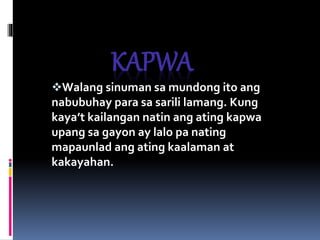Why is language important in our interactions with others? The answer lies in the phrase “bakit mahalaga ang wika sa kapwa,” or “why is language important to our fellow human beings?” Language is more than just a tool for communication; it is the key that unlocks understanding, empathy, and connection between individuals. When we speak and understand each other’s languages, we bridge the gaps that often divide us, creating a space for collaboration, appreciation, and the sharing of diverse perspectives. In this article, we will explore the significance of language in our interactions with others and why it is crucial to embrace and respect the languages of our fellow human beings. Let’s delve into the power of language and the impact it has on our relationships and society.
Bakit Mahalaga ang Wika sa Kapwa?
Language plays a crucial role in human communication and interaction. It serves as a tool for expressing thoughts, ideas, and emotions. Wika, or language, is deeply intertwined with our identity as individuals, communities, and nations. In the Philippines, where a diverse range of languages are spoken, the importance of wika sa kapwa, or language among fellow countrymen, cannot be overstated. In this article, we will explore various reasons why wika sa kapwa is vital and how it contributes to the fabric of Filipino society.
Preservation of Cultural Heritage
One of the primary reasons why wika sa kapwa is essential is its role in preserving cultural heritage. Language serves as a vessel for transmitting traditions, customs, and values from one generation to another. In the Philippines, the country’s rich linguistic diversity reflects the nation’s diverse cultural tapestry. Each language carries unique insights into the history, beliefs, and practices of different indigenous groups.
By valuing and preserving these languages, Filipinos ensure the continuity of their cultural heritage. Language serves as a bridge between the past and the present, allowing future generations to understand and appreciate their roots. As the world becomes increasingly interconnected, the preservation of wika sa kapwa becomes even more crucial in retaining and celebrating cultural diversity.
Effective Communication and Understanding
Language is the cornerstone of effective communication and understanding among individuals. When people share a common language, it becomes easier to convey thoughts, express emotions, and exchange ideas. Wika sa kapwa fosters unity and cooperation by enabling Filipinos to communicate and understand one another.
Clear and effective communication is vital in various contexts, including education, business, and social interactions. In educational settings, educators can effectively convey knowledge and facilitate learning when they use a language that students understand. In the workplace, effective communication in a common language promotes collaboration, productivity, and a harmonious working environment.
Moreover, language is not merely a means of conveying information; it also shapes our perception and understanding of the world. Different languages have unique vocabulary and structures that influence how speakers perceive and interpret reality. By embracing wika sa kapwa, Filipinos gain a deeper understanding of their fellow countrymen and foster empathy and respect for diverse perspectives.
Preservation of Indigenous Knowledge
Indigenous knowledge refers to the collective knowledge, wisdom, and practices of indigenous communities. It encompasses a wide range of fields, including agriculture, medicine, arts, and spirituality. Language serves as a vital tool for transmitting and preserving this indigenous knowledge.
In many indigenous communities, knowledge is passed down orally from one generation to another. Language is the primary medium through which traditional knowledge is shared, ensuring its continuity and relevance. By promoting wika sa kapwa, Filipinos contribute to the preservation and revitalization of indigenous knowledge systems, safeguarding invaluable cultural resources for future generations.
Fostering Identity and Belonging
Language is closely intertwined with personal and collective identity. The language we speak shapes our sense of self and belonging. Wika sa kapwa plays a central role in fostering a sense of identity and belonging among Filipinos.
Language is not just a tool for communication; it carries cultural nuances and expressions that reflect the values, customs, and shared experiences of a community. When individuals speak their native language, they feel a sense of connection to their roots and the community to which they belong. Wika sa kapwa serves as a powerful symbol of Filipino identity and unity.
Promoting Social Inclusion
Language can either be a barrier or a bridge to social inclusion. In a society as linguistically diverse as the Philippines, promoting wika sa kapwa is essential for ensuring that all individuals can participate fully in social, economic, and political life.
When individuals are not proficient in the dominant language of a society, they may face barriers in accessing education, employment, healthcare, and other essential services. By embracing and valuing different languages, Filipinos can create a more inclusive society where everyone has an equal opportunity to thrive.
Furthermore, recognizing and respecting the linguistic rights of minority groups promotes cultural diversity and prevents the marginalization of certain communities. Wika sa kapwa can empower individuals and foster a society where everyone’s voice is heard and valued.
Enhancing National Unity
Language has the power to unite and be a catalyst for national unity. Wika sa kapwa plays a vital role in fostering a sense of shared identity and belonging among Filipinos, transcending regional, ethnic, and socio-economic differences.
The Philippines, with its rich linguistic diversity, has Filipino, also known as Tagalog, as its national language. Filipino serves as a unifying language that enables Filipinos from different linguistic backgrounds to communicate with one another. By embracing Filipino as a shared language, the nation strengthens its sense of unity and common purpose.
Wika sa kapwa, or language among fellow countrymen, is undeniably crucial in the Philippines. It preserves cultural heritage, facilitates effective communication and understanding, preserves indigenous knowledge, fosters identity and belonging, promotes social inclusion, and enhances national unity. By recognizing the significance of wika sa kapwa and valuing the diverse languages spoken in the Philippines, Filipinos can celebrate their cultural richness and build a stronger, more inclusive society.
Mahalaga ang wika sa sarili lipunan at kapwa❤️ Video presentation in Filipino
Frequently Asked Questions
Why is language important in interpersonal communication?
Language plays a crucial role in interpersonal communication as it allows individuals to express their thoughts, emotions, and ideas to others. It enables people to connect, understand, and relate to one another, fostering meaningful relationships and building trust.
How does language contribute to cultural identity?
Language is a fundamental aspect of cultural identity. It reflects the values, beliefs, customs, and traditions of a particular group or community. Through language, individuals can preserve and transmit their cultural heritage from one generation to another, strengthening their sense of belonging and preserving their unique identity.
What are the benefits of speaking the same language as others in a community?
Speaking the same language as others in a community promotes unity, cooperation, and collaboration. It facilitates effective communication, making it easier to exchange information, solve problems, and work towards common goals. It also helps in fostering a sense of inclusion, understanding, and empathy among community members.
How does language affect social integration and inclusion?
Language plays a crucial role in social integration and inclusion as it allows individuals to participate fully in society. Proficiency in the dominant language of a community enables individuals to access education, employment opportunities, healthcare services, and social activities. It reduces barriers and empowers individuals to engage actively in their community, promoting social cohesion and equal opportunities for all.
Why is it important to respect and preserve indigenous languages?
Respecting and preserving indigenous languages is essential for cultural diversity and the overall well-being of indigenous communities. Indigenous languages hold valuable knowledge, wisdom, and cultural traditions that have been passed down through generations. By preserving these languages, we ensure the continuation of unique cultural perspectives, traditions, and heritage, and promote inclusivity and equal recognition of all cultures.
Final Thoughts
Language is not just a means of communication; it is an essential part of our identity and connection to others. That is why it is significant to recognize the importance of language towards our fellow human beings. “Bakit mahalaga ang wika sa kapwa” (Why language is important to others) encapsulates the notion that language bridges gaps, fosters understanding, and promotes empathy. It is through language that we can truly express ourselves and nurture meaningful relationships. So let us value and appreciate the power of language in connecting with our fellow individuals, for it is through this understanding that we can build a stronger and more compassionate society.


